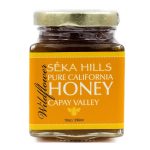Excerpt from Ari’s Top 5 enews
Honey from the Appalachian Mountains

Grace Singleton—Deli Co-Managing Partner and new Stewardship Council member—and I have many things in common. One of them is our passion for single-origin honey. And both of us are smiling broadly right now over the recent arrival of two honeys, rarely seen outside their home region.
These special honeys come to us from the Appalachian Beekeeping Collective (ABC). Its philosophy and its work are an inspiration, and the honeys are, happily, as flavorful as the philosophy. In the new “A Taste of Zingerman’s Food Philosophy” pamphlet, I share our long-standing (32 years now) definition of quality here in the ZCoB: we look for foods that are both traditional and full flavored. We define the latter to mean “complexity, balance, and finish.” These two honeys could be featured on a poster promoting that definition. They fit our definition to a “T.”
The honeys are the “end product” of the ABC project, but there’s much more to their work than what we have on our shelves. Embracing the idea of ecosystem thinking, the folks at ABC offer both training and equipment to help locals in economically distressed parts of the region begin traditional beekeeping. Those who are interested get a mentor, training materials, and a whole lot of healthy support. The ABC folks describe their work:
We extract, bottle, market, and distribute ABC honey on behalf of member beekeepers. We connect to consumers who would be otherwise inaccessible to small-scale rural beekeepers, helping members of the Collective earn a sustainable income from their hard work. … Teaching people how to keep bees helps them understand local ecosystems and increases their awareness of world-wide threats to pollinators such as climate change and deforestation.
Both of the honeys we have on hand are clear, flowing, floral, delicate, and exceptionally complex in their flavors. They taste like nothing else I’ve had. Honeys from the hills like this have typically been very hard to find outside the region (you find them at roadside stands and local shops, but that’s about it). Deforestation and commercial development have made them rarer still. All of which tells you why we’re particularly excited to have them.
Sourwood — Also known as the Appalachian Lily, the Sourwood honey is gathered in the spring, up in the hills of West Virginia and southwestern Virginia. Sourwood is so special to the region that it’s been on Slow Food’s Ark of Taste for many years. Since the Sourwood tree blooms in late June through the month of July, there are very few other flowers blooming at the time which makes it much easier to ensure the purity of this exceptional honey. Light, delicate with a little bit of lemon-lime loveliness in the finish.
Black Locust — James Beard award-winning journalist Andrew Zimmern, who introduced me last week at the Welcome Conference, says of this honey that it’s “the extra-special kind you’d happily slather on a biscuit.” The tree itself is native to the region and is a terrific contributor to restoring depleted soils. The honey is clear and liquid (unlike later season honeys that are generally more crystalline) but is surprisingly, almost gently chewy in texture. Loads of spice notes and a lovely bit of menthol. Sort of like eating a delicate spice cake by the spoonful! Both honeys would be great on a toasted Zinglish Muffin.



